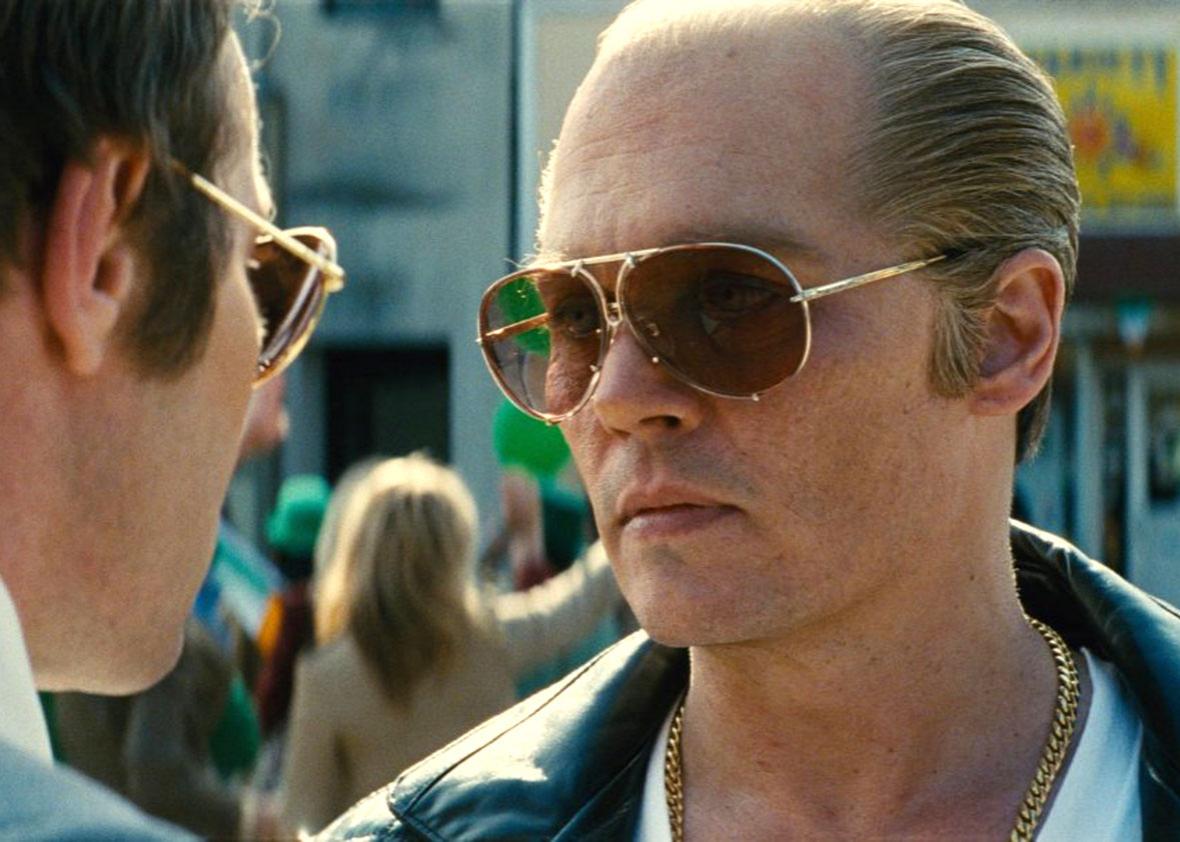Casting Johnny Depp as the fabled Boston crime boss James “Whitey” Bulger didn’t sound, on paper, like the most promising proposition. Depp tends to excel at, and to revel in, playing hyperstylized characters who exist in fanciful filmic worlds: He’s perfectly at his ease as a vampire, a pirate, a blade-fingered freak, or a singing demon barber but can seem uncomfortable inhabiting the skin of real-life people, whether it’s a Prohibition-era gangster (Public Enemies) or a disco-era cocaine importer (Blow).
Black Mass, a Bulger biopic directed by Scott Cooper, is based on an all-too-true story about a decidedly unfanciful world: the grim streets of South Boston during Bulger’s criminal reign, which ran from the mid-’70s to the mid-’90s. Yet Depp’s performance as Bulger is as strong, and as energized, as anything he’s done on screen for years. (If there’s any earlier Depp vehicle this movie resembles, it’s the 1997 mob drama Donnie Brasco, in which he gave a fine naturalistic performance as an undercover FBI agent cozying up to Al Pacino’s sad-sack hit man.) After making a career for decades off his own inextinguishable charisma (with enough success that he now owns an island in the Bahamas), Depp has taken a role that allows him to examine charisma’s dark side—the unholy power that can accrue to people who know how to make others love them, fear them, and, most chillingly, obey them. Depp’s Jimmy Bulger (call him Whitey, explains another character, and you might get on his bad side—never a wise move) does have his share of vampire-like elements, starting with a piercing ice-blue stare that comes courtesy of the creepiest contact lenses since Ray Milland’s in X: The Man With X-Ray Eyes. But the character is neither written nor played as an over-the-top monster. Jimmy’s menace lies in his stillness, his coldly assessing intelligence, and his unpredictable and lightning-fast shifts between canny businessman and ruthless butcher.
It takes a while for Jimmy Bulger to emerge as Black Mass’s lead character—indeed, you could argue that he never quite does, given the near-equal importance to the narrative of Joel Edgerton’s John Connolly, an FBI agent who grew up in the rough Southie neighborhood with Bulger as his friend and protector. Jimmy Bulger wasn’t the only boy in his family to rise to a position of power: His younger brother Billy (Benedict Cumberbatch) is a Massachusetts state senator with ambitions to become something more. The story of how Jimmy Bulger went from small-time hood to Boston’s top kingpin gets told from the points of view of multiple minor players, all testifying against their former boss into a reel-to-reel recorder at a police station. Jesse Plemons, who played a vile neo-Nazi thug in the last two seasons of Breaking Bad, is the first of these narrators, Bulger’s dimwitted but loyal bodyguard and driver. The wonderful character actor Rory Cochrane plays Steve Flemmi, Jimmy’s right-hand man, whose eyes burn with repressed self-loathing as he commits unspeakable acts at his boss’s behest. Peter Sarsgaard has a brief but memorable arc as a coke-addicted gun for hire.
The true-life story of Bulger and Connolly’s long relationship might have been scripted for a gangster epic. (The screenplay, by Mark Mallouk and Jez Butterworth, is based on a book by Dick Lehr and Gerard O’Neill, former Boston Globe reporters.) Using his childhood bond with the Bulger brothers as a wedge, Connolly prized his way into Jimmy’s inner circle, eventually convincing him to become an FBI informant—not snitching on his own gang, but on the Italian mafia that ruled the city’s North End. For years, Connolly and Bulger mutually profited from this arrangement: Bulger was able to put the competition behind bars just as the drug trade was taking off, rising to the top of the Boston underworld as a result. Connolly, for his part, was able to build his reputation at the bureau as a taker-down of bad guys while enjoying the spoils of the mob lifestyle: decadent parties, flashy suits, gold watches.
The heart of the movie lies in the friendship—and for all its complications and uneasy alliances, it does amount to a real friendship of sorts—between the pugnacious but vulnerable lawman and the soft-spoken but death-dealing criminal. But there are other significant relationships as well, like the strained loyalty between the two Bulger brothers, each striving to succeed in his own racket, one making the laws, one breaking them. Or the deteriorating marriage of Connolly and his wife (Julianne Nicholson), who’s not thrilled about the alleged murderers who gather to grill steaks on her back porch. Secondary characters with no more than a scene or two apiece—including Corey Stoll as an FBI higher-up and Juno Temple as a prostitute—leave a lasting impression.
Though it’s directed by Cooper (Crazy Heart) with an able hand and a fair degree of visual style, Black Mass can’t be said to reinvent the gangster movie; it pulls tricks from Goodfellas, The Godfather, The Departed, and a host of other sagas. But the movie’s ace in the hole is Depp’s performance as the psychotic but never inhuman Jimmy, a man capable of returning from a long night of extortion and beatings to play an affectionate game of cards with his aged mother. He may never win our sympathy or understanding, but he has a way—as criminals and movie stars will do—of capturing our complete attention.
